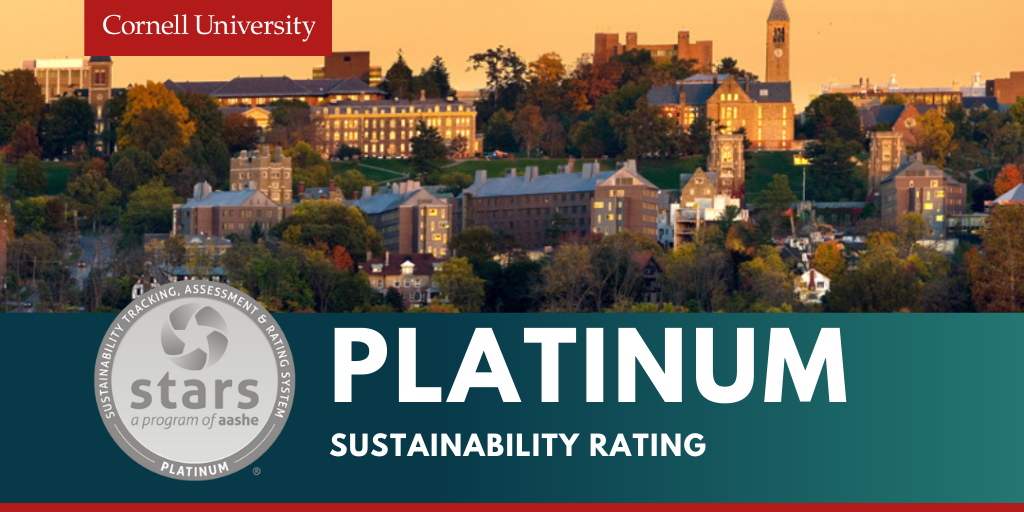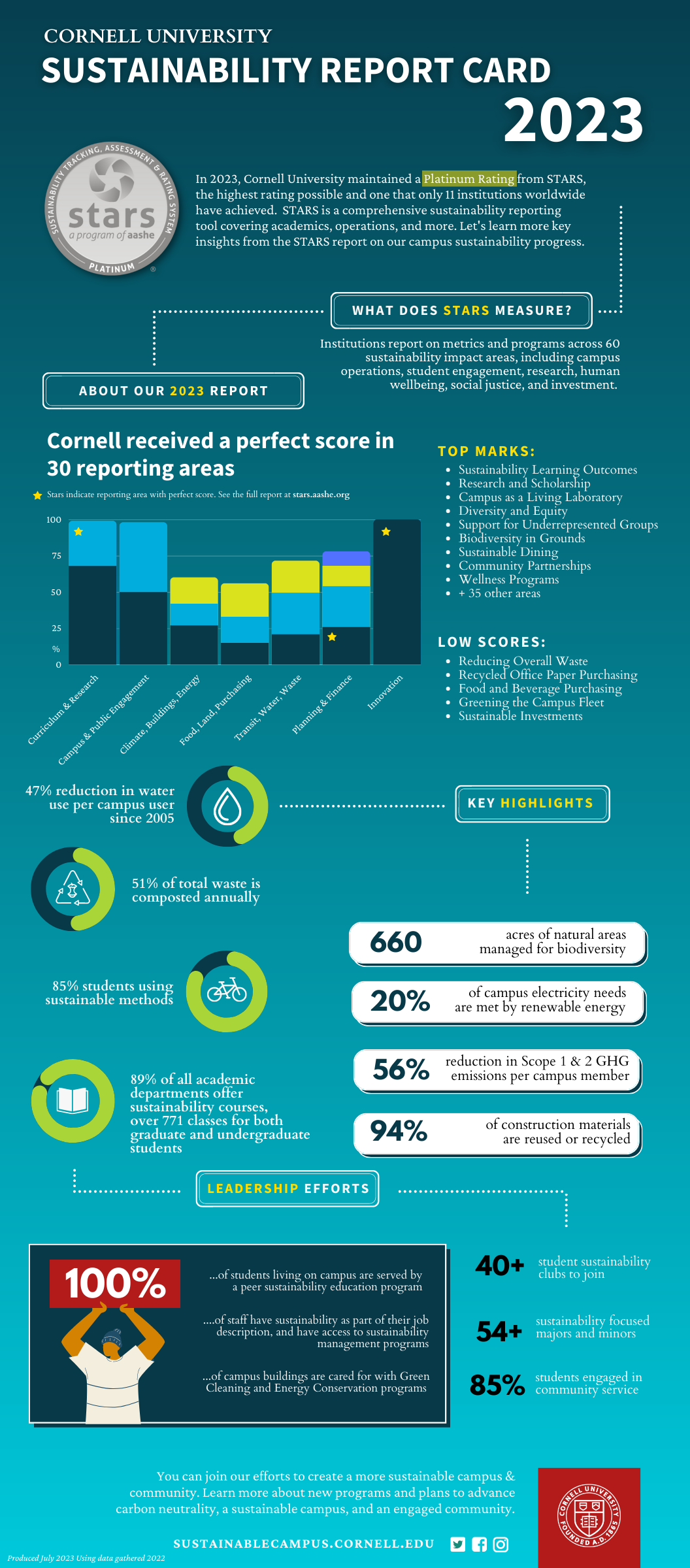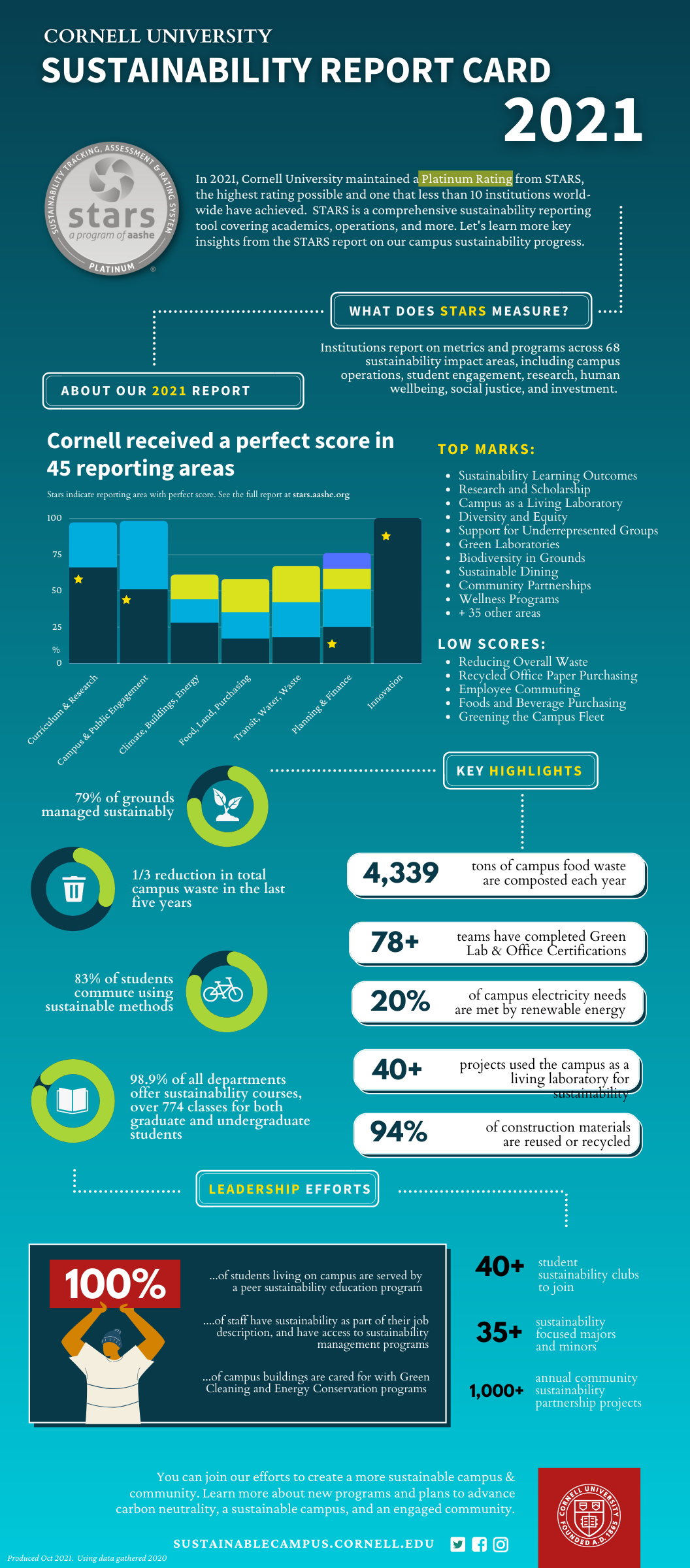STARS Reporting
The Sustainability Tracking, Assessment, & Rating System (STARS) is a comprehensive and transparent reporting framework for universities to track their sustainability performance. The framework addresses environmental, social, and economic dimensions of sustainability and encourages continual improvement across all sustainability metrics. Cornell annually reports on 100s of metrics related to campus operations, education, and more and currently holds the highest possible rating: Platinum.

Current STARS Rating: Platinum
Cornell is the only campus in the world to have received a Platinum Rating for four consecutive years. Of the four major areas of reporting, this year Cornell received a score of 99% in Academics, 98% in Engagement, 79% for Operations, and 78% for Planning and Administration, as well as a full score for innovation credits. Full points were achieved in 38 out of 60 reporting areas.
As of Spring 2023, only 11 institutions in the world hold a Platinum Rating.
Areas of Achievement
Sustainability Curriculum
Cornell professors incorporate sustainability content within all disciplines, including business, architecture, engineering, and the arts. Over 19% of all courses offered are sustainability-focused or sustainability-inclusive. A list of the sustainability course offerings can be found on the Sustainability Course Guide or by searching for “CU-SBY” on the main catalog home page.
Learning Outcomes for Sustainability
33% of Cornell students graduate from programs that require an understanding of sustainability, including from degree programs that have learning outcomes focused on sustainability or require students to take a sustainability course.
Students can major, minor, or concentrate in 54 undergraduate programs and 60 graduate programs focused on sustainability, including Agricultural Sciences, Atmospheric Sciences, Design + Environmental Analysis, Earth and Atmospheric Sciences, Environment & Sustainability, Environmental Engineering, Entomology, Global & Public Health Sciences, Global Development, Food Science, Landscape Architecture, Nutritional Sciences, Plant Sciences, and Urban and Regional Studies.
Incoming students complete a sustainability assessment and learning module, Mission Sustainability, before arriving on campus. The module measures sustainability knowledge and beliefs, and provides pathways for students to get involved in sustainability during their Cornell careers.
Research
38% of employees and 91% of departments are currently engaged in sustainability-focused research, including 654 Faculty Fellows through the Cornell Atkinson Center for Sustainability. The Fellows are working to identify and advance innovative sustainability research and initiatives at Cornell.
Commuting
85% of students use sustainable transportation such as walking, biking, carpooling, or riding the TCAT bus system as their primary means of commuting to and across campus. Most students choose to walk to and from campus, with the TCAT being the second most common mode of transportation.
A recent survey also found that 58% of Cornell employees work hybrid or remotely, which has significantly reduced the number of commutes to campus.
Food & Waste Composting
In every Cornell Dining unit, all of the pre-consumer food waste is collected and composted by Cornell Farm Services. This includes all food discarded during preparation and cooking, before being served to customers. Cornell Dining also works with the Food Recovery Network to donate prepared, perishable food to food banks in the Finger Lakes Region five days a week.
Currently, 51% of our total waste generated on campus is composted annually. Composting is available in all residential communities as part of the Residential Compost Program. There are also several compost drop spots throughout campus.
Water Use
We have cut our potable water use per weighted campus user by nearly half (47% reduction) since 2005. In addition to replacing plumbing fixtures, fittings, appliances, equipment, and systems with more water-efficient alternatives, we also have several water-saving initiatives including using non-potable water to irrigate athletic fields and landscaping on campus.
Green House Gas Emissions
Since 2005, we have reduced our adjusted net Scope 1 and Scope 2 GHG emissions per weighted campus user by 56%, all while our campus and student body has grown.
Areas for Improvement
Waste
- Over 595 pounds of waste is generated per campus community member each year — an increase of nearly 90 pounds per person from 2021. Addressing this issue requires the whole Cornell community to have greater consideration of the life cycle of purchases, including the single-use packaging that often gets sent to the landfill.
We can also increase the percentage of waste diverted from the landfill or incinerators by recycling, composting, donating, or re-using a larger proportion of “waste”. Currently, 37% of Cornell’s total waste is disposed of in a solid waste landfill or incinerator. While 12% of our total waste is recycled, donated, or reused.
Food & Dining
Currently, the STARS report shows only 20% of total annual food and beverage expenditures are on plant-based foods, and only 1% on products that are third-party verified as sustainably or ethically produced. However, the STARS system's third-party verification requirement excludes significant purchases from small vendors who can't afford such certifications, products for which no such certification exists, and even self-produced products (like Cornell's own dairy products). Further, a refinement of how the university tags and categorizes food purchases would likely illuminate a larger number. Dining actively works to increase the proportion of sustainably sourced, plant-based food and beverages and participates in Menus of Change. By choosing such products when dining on campus, each of us can support this effort.
Paper and Janitorial Purchasing
Only 1% of office paper expenditures go towards any type of paper with 50% or more post-consumer recycled content, or FSC Recycled label paper, with the majority of our paper purchases going towards paper with a 10-49% recycled content. Moving towards paper stock that is made of 100% recycled materials and reducing paper use overall are positive changes every campus member can embrace.
Sustainable Investments
- A few years ago, Cornell instituted a moratorium on new private investments focused on fossil fuels, marking a huge accomplishment in pushing toward alternative energy investments. 3% of the institution's investment pool is currently allocated to specific, positive sustainability investments, including funds towards renewable energy or sustainable forestry and sustainable investment funds.
- It is worth noting that the average score in this reporting area is low for most institutions.
Note on STARS Benchmarking
STARS is a benchmarking tool, and therefore represents a baseline by which campuses can compare and work towards progress in a comprehensive sustainability framework. Comparing scores and progress to other similar institutions (for instance, campuses with over 14million sq. ft, research institutions, or campuses with a similar population and climate) is useful, but not a complete picture of how progress should be measured or achieved.
Each campus, including Cornell, has a unique culture and operational framework that require our community to innovate and create a culture of sustainability in ways that may not be captured by STARS. Even if our campus was able to achieve a perfect STARS Score, it would be the beginning of a leadership journey in sustainability, not the end.
About STARS Reporting
Cornell annually collects and publishes 1,000s of metrics in the Sustainability Tracking, Assessment & Rating System (STARS) with the help of 40+ campus subject matter experts. STARS is administered by the Association for the Advancement of Sustainability in Higher Education (AASHE). STARS includes 68 reporting areas, including academics & research, education & engagement, campus operations, and coordination & planning, as well as innovation credits. Reports date back to 2012 and can be compared with other participating Universities across the U.S. and the world.
Note: STARS reports are published in the Spring and use data from the previous fiscal year or most recent data available within at least three years.
Recent News on STARS
09.14.2021 Cornell soars in 2021 college sustainability rankings
04.02.2022 Cornell outperforms peers in annual sustainability assessment
10.27.2020 Cornell earns top marks in sustainability from national rating platforms
06.05.2020 Cornell earns STARS platinum sustainability rating
Previous Reports
STARS Reporting
The Sustainability Tracking, Assessment & Rating System (STARS) is a comprehensive and transparent reporting framework for universities to track their sustainability performance. Cornell annually reports on 100s of metrics related to campus operations, education, and more and currently holds the highest possible rating: Platinum.

2022 STARS Rating: Platinum
Cornell achieved a fourth consecutive Platinum Rating, the highest available. The overall score is 86.88 out of 100, an improvement of .53 points over the previous year.
Cornell University has made significant progress in sustainability across all areas of reporting, despite the challenges posed by the COVID-19 pandemic. Cornell is the only campus in the world to have received a Platinum Rating for three consecutive years. Of the four major areas of reporting, this year Cornell received a score of 99% in Academics, 98% in Engagement, 79% for Operations, and 78% for Planning and Administration, as well as a full score for innovation credits. Full points were achieved in 36 out of 65 reporting areas.
As of Spring 2023, only 11 institutions in the world hold a Platinum Rating. Previous to receiving the first Platinum Rating in 2019. The overall score has increased 23% since reporting began in 2012.
Areas of Achievement
Overall Scores & Full Points Achieved
Of the four major areas of reporting, this year Cornell received a score of 99% in Academics, 98% in Engagement, 79% for Operations, and 78% for Planning and Administration, as well as a full score for innovation credits. Full points were achieved in 36 out of 60 reporting areas.
Learning Outcomes for Sustainability
33% of Cornell students graduate from programs that require an understanding of sustainability. Cornell also requires all incoming students to complete Mission Sustainability, a sustainability assessment and learning module. The module measures sustainability beliefs and literacy and encourages students to get involved in sustainability and climate justice during their Cornell careers.
Sustainability Curriculum
19% of all courses offered are sustainability-focused or sustainability-inclusive. Cornell professors teach sustainability content across all disciplines, including business, architecture, engineering, and the arts. A list of the sustainability course offerings can be found on the Sustainability Course Guide or by searching for “CU-SBY” on the main catalog home page.
Students can major, minor, or concentrate in 58 undergraduate programs and 82 graduate programs focused on sustainability, including Global & Public Health Sciences, International Agriculture & Rural Development, Design + Environmental Analysis, Agricultural Sciences, Biological Engineering, Developmental Sociology, Earth and Atmospheric Sciences, Entomology, Environmental Engineering, Fiber Science and Apparel Design, Food Science, Landscape Architecture, Nutritional Sciences, Plant Sciences, and Urban and Regional Studies.
Research
38% of employees and 91% of departments are currently engaged in sustainability-focused research, including 654 Faculty Fellows through the Cornell Atkinson Center for Sustainability. The Fellows are working to identify and advance innovative sustainability research and initiatives at Cornell.
Commuting
85% of students use sustainable transportation such as walking, biking, carpooling, or riding the TCAT bus system as their primary means of commuting to and across campus. Most students choose to walk to and from campus, with TCAT being the second most common mode of transportation.
A recent survey also found that 58% of Cornell employees work hybrid or remotely, which has caused a significant decrease in the number of commutes to campus.
Efforts to make the TCAT services more equitable and accessible have included initiatives to allow all Cornell employees to have unlimited Bus Ride privileges, including night routes, with their CUID. All registered students also receive free, unlimited rides on all TCAT buses after 6 p.m. weekdays, and anytime Saturday and Sunday; and New-to-Cornell students automatically have unlimited TCAT privileges in their first year as a matriculated student in a degree program.
Composting
In every Cornell Dining unit, all of the pre-consumer food waste is collected and composted by Cornell Farm Services. This includes all food discarded during preparation and cooking, before being served to customers. Cornell Dining also works with the Food Recovery Network to donate prepared, perishable food to food banks in the Finger Lakes Region five days a week.
Composting is also available in all residential communities as part of the Residential Compost Program. There are also several compost drop-spots throughout campus.
Currently, 51% of our total waste generated on campus is composted annually.
-
Areas for Improvement
-
Paper Purchasing
Only 2.8% of office paper expenditures go towards any type of paper with 50% or more post-consumer recycled content, or FSC Recycled label paper. -
Electronics Purchasing
Although 80% of electronics purchased at Cornell are EPEAT certified, ideally, 100% of electronics including computers, displays, tablets, televisions, copiers, mailing machines, printers and scanners should be certified.
-
Waste
One of the few areas where performance has decreased over time. Due to recycling changes in the county and country, and lack of engagement across campus, over 507 lbs of waste is generated per campus community member each year. -
36% of Cornell’s total waste is disposed of in a solid waste landfill or incinerator. We hope to increase the percentage of waste diverted from the landfill or incinerator by recycling, composting, donating or re-selling.
-
Cleaning Supplies
Only 7% of expenditures on cleaning and janitorial products that are third party certified to meet recognized sustainability standards. However, a working group of the Sustainable Cornell Council is currently working to improve this area. -
Food & Dining
Currently, the STARS report shows only 1% of total annual food and beverage expenditures spent on products that are sustainably or ethically produced - however, refinement of how the University tags and categorizes food purchases would likely illuminate a larger number.
Positively, 50% of total annual food and beverage expenditures are plant-based. Dining is actively working to increase the proportion of sustainably sourced, plant-based food and beverages and participates in Menus of Change. -
Sustainable Investments
Recently, Cornell instituted a moratorium on new private investments focused on fossil fuels. Today only 2.45% of the institution's investment pool is currently allocated to positive sustainability investments. It is worth noting that the average score in this reporting area is low for most institutions - averaging .6 out of 5 possible points as of Spring 2022 - indicating an opportunity for best-practice sharing in this area across the higher education community.
Note on STARS Benchmarking
STARS is a benchmarking tool, and therefore represents a baseline by which campuses can compare and work towards progress in a comprehensive sustainability framework. Comparing scores and progress to other similar institutions (for instance, campuses with over 14million sq. ft, research institutions, or campuses with a similar population and climate) is useful, but not a complete picture of how progress should be measured or achieved.
Each campus, including Cornell, has a unique culture and operational framework that require our community to innovate and create a culture of sustainability in ways that may not be captured by STARS. Even if our campus was able to achieve a perfect STARS Score, it would be the beginning of a leadership journey in sustainability, not the end.
Cornell annually collects and publishes 1,000s of metrics in the Sustainability Tracking, Assessment & Rating System (STARS) with the help of 40+ campus subject matter experts. STARS is administered by the Association for the Advancement of Sustainability in Higher Education (AASHE). STARS includes 68 reporting areas, including academics & research, education & engagement, campus operations, and coordination & planning, as well as innovation credits. Reports date back to 2012 and can be compared with other participating Universities across the U.S. and the world.
Note: STARS reports are published in the Spring and use data from the previous fiscal year or most recent data available within at least three years.
Recent News on STARS

2021 STARS Report
In 2021 Cornell achieved a second Platinum Rating with an overall score of 85.1 out of 100. Platinum is the highest possible rating. To date, only eleven institutions worldwide and nine nationally have achieved this rating. Previously Cornell held the longest-running Gold Rating for 8 consecutive years. The overall score has increased 24% since reporting began in 2012.
Areas of Achievement
Perfect Scores
Cornell scored perfectly in 40 (out of 64) reporting areas this year. The campus was recognized with a perfect score for work in Campus Engagement, Community Partnerships, Campus Biodiversity, Research & Scholarship, Sustainable Dining, Support for Sustainable Transportation, and providing Immersive Experience programs in sustainability, such as living laboratory projects.
Open Access to Research
The Cornell Library’s Open Access Fund advances access to scholarly publications, supporting the idea that sustainability research must be open-access in order to accelerate necessary and urgent solutions across institutions and communities.
Learning Outcomes for Sustainability
17% of students graduate from programs that require an understanding of the concept of sustainability. The Provosts of Cornell's colleges have worked to strengthen learning outcomes that support literacy of the interconnectedness of people, prosperity, and the planet. The ultimate goal is to institutionalize sustainable learning outcomes within each college. Cornell also requires all incoming students to complement a sustainability assessment and learning module as part of their "To Do List," which engages students in learning and helps staff measure literacy in key topics over time.
Sustainability Courses and Majors, Minors
16% of all courses offered have a sustainability focus or content. 40+ living laboratory projects take place each year utilizing the campus as an innovation hub for sustainability solutions. n addition to the newly launched E&S major, students at Cornell can major in over 15 programs that focus on sustainability, including Global & Public Health Sciences, International Agriculture & Rural Development, Design + Environmental Analysis, Agricultural Sciences, Biological Engineering, Developmental Sociology, Earth and Atmospheric Sciences, Entomology, Environmental Engineering, Fiber Science and Apparel Design, Food Science, Landscape Architecture, Nutritional Sciences, Plant Sciences, and Urban and Regional Studies.
There are also 20+ minors focused on sustainability.
Commuting
83% of Cornell students, both graduate and undergraduate, use sustainable or alternative transportation options as their primary means of mobility across campus, to work and class. Specifically, about 50% of the student body walks, cycles, or uses another non-motorized mode as their primary means of transportation, and about 32% of employees use more sustainable commuting options as their primary mode of transportation.
Improved in all three categories: Campus Fleet, Commute Modal Split, Support for Sustainable Transportation due to new initiatives such as partnerships with Ithaca Carshare, incentives for fuel-efficient vehicles, and the OmniRide Program to provide free, unlimited bus transportation.
Food Purchasing & Compost
90% of dairy purchases and 27% of fresh produce are grown and/or processed within 250 miles of campus. 34% of total annual food and beverage expenditures are on plant-based foods. Over 1,000 tons of food waste are composted annually by Farm Services, along with 6,377 tons of animal manure and bedding and 217 tons of plant material and soil, and composting is available in all residential communities as part of the Residential Compost Program.
Areas for Improvement
Wellbeing / Wellness
Cornell loses points for allowing smoking on campus, and for having a higher # of workplace accidents than in previous years.Governance
Full points are only available to institutions with a balance in gender representation on key governing committees. Due to a change in the Cornell Board of Trustees composition this year, full points were not achieved.Paper Purchasing
Only 12.3% of office paper expenditures go towards 90-100% post-consumer recycled paper, or FSC Recycled label paper.Electronics Purchasing
Although 80% of electronics purchased at Cornell are EPEAT certified, ideally, 100% of electronics including computers, displays, tablets, televisions, copiers, mailing machines, printers and scanners should be certified.Waste
One of the few areas where performance has decreased over time. Due to recycling changes in the county and country, and lack of engagement across campus, the current score is 57%, with over 660 lbs of waste generated per campus community member each year.Note on STARS Benchmarking
STARS is a benchmarking tool, and therefore represents a baseline by which campuses can compare and work towards progress in a comprehensive sustainability framework. Comparing scores and progress to other similar institutions (for instance, campuses with over 14million sq. ft, research institutions, or campuses with a similar population and climate) is useful, but not a complete picture of how progress should be measured or achieved.Each campus, including Cornell, has a unique culture and operational framework that require our community to innovate and create a culture of sustainability in ways that may not be captured by STARS. Even if our campus was able to achieve a perfect STARS Score, it would be the beginning of a leadership journey in sustainability, not the end.
2021 Sustainability Reporting Infographic
2020 STARS Rating: Platinum
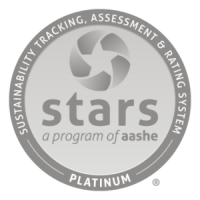 Total Points: 85.05pts
Total Points: 85.05pts
2020 Full STARS Report
In 2020, Cornell University became the 6th University in the world to achieve a Platinum Rating from the Association for the Advancement of Sustainability in Higher Education (AASHE), the highest possible rating.
Prior to 2020, Cornell also held the longest-running Gold Rating, for the previous 8 consecutive years. The score has increased 24% since reporting began. STARS is a mechanism for benchmarking sustainability progress, identifying key topics to continue improving and areas of success to share with other institutions and local, state, and national partners.
Key Highlights
Perfect Scores
Cornell scored perfectly in 45 (out of 68) reporting areas this year. The campus was recognized with a perfect score for work in Community Partnerships, Inter-Campus Collaboration, Campus Biodiversity, Research & Scholarship, Support for Sustainable Transportation, and providing Immersive Experience programs in sustainability, such as living laboratory projects.
Open Access to Research
Thanks to the Cornell Library’s Open Access Fund, Cornell received recognition for advancing access to open scholarly publication sources. This supports the idea that sustainability research must be open-access in order to accelerate necessary and urgent solution across institutions and communities.
Learning Outcomes for Sustainability
100% of Cornell students graduate from Colleges that have sustainability as part of their core learning outcomes. The Provosts of Cornell's colleges have worked to strengthen learning outcomes which support literacy of the interconnectedness of people, prosperity, and the planet.
Sustainability Courses and Majors, Minors
40+ living laboratory projects take place each year across Cornell's 10 focus areas, and over 1500+ students have taken Leadership for Sustainability and the Green Revolving Fund sustainability courses focused on peer education and campus operations. 16% of all courses offered have a sustainability focus or content. See a current list of Cornell Sustainability Courses.
With the addition to the newly launched ESS major, students at Cornell can major in 15 programs that focus on sustainability, including The Global & Public Health Sciences major, International Agriculture & Rural Development, Design + Environmental Analysis, Agricultural Sciences, Biological Engineering, Developmental Sociology, Earth and Atmospheric Sciences, Entomology, Environmental Engineering, Fiber Science and Apparel Design, Food Science, Landscape Architecture, Nutritional Sciences, Plant Sciences, and Urban and Regional Studies. There are also 20+ minors focused on sustainability.
Commuting
83% of Cornell students, both graduate and undergraduate, use sustainable or alternative transportation options as their primary means of mobility across campus, to work and class.
Food Purchasing & Compost
90% of dairy purchases and 27% of fresh produce are grown and/or processed within 250 miles of Cornell University or third-party certified. Over 1,000 tons of food waste are composted annually by CUEAS Farm Services, along with 6,377 tons of animal manure and bedding and 217 tons of plant material and soil.
2020 STARS Infographic
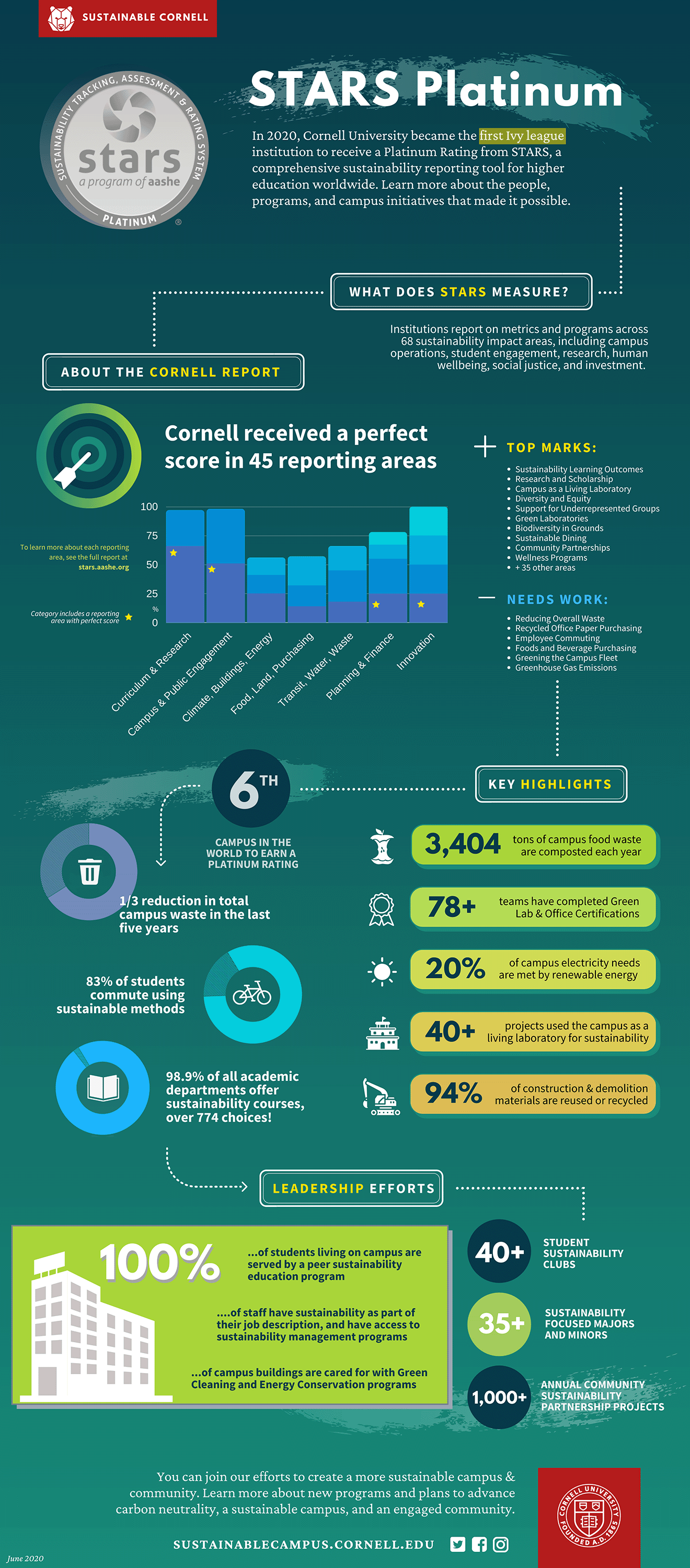
2019 STARS Highlights
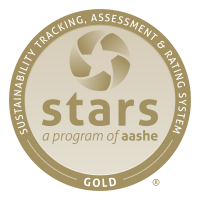 Gold Rating: 73.84pts
Gold Rating: 73.84pts
2019 Full STARS Report
The Gold Rating was achieved for the 8th consecutive year. The score has increased 7% in the last two years; the University has received a Gold rating every year of participation.
Areas of Progress
#1 for Ivy Institutions and New York State
Cornell had the highest ranking of any Ivy League institution, and highest overall ranking of any institution in New York State. However, of the "Ivy+" institutions, Cornell ranks second after Stanford University, which has achieved a Platinum rating.
1st in Coordination & Planning
Cornell had the highest ranking of any Ivy League institution, and highest overall ranking of any institution in New York State.
13th in Diversity & Affordability
Cornell was listed as 13th in the country for Diversity and Affordability, and 2nd for campuses in New York State.
Sustainability Course Offerings Cornell offers 886 courses with sustainability content and launched an Environment & Sustainability major open to all disciplines. Cornell also earns full credit for the category of "Campus as a Living Laboratory", utilizing campus for applied learning and research in relation to Air and Climate. Over 480 faculty and staff are engaged in sustainability research as well. Cornell Sustainability Courses
Commuting
Over 90% of Cornell students, both graduate and undergraduate use sustainable or alternative transportation options as their primary means of mobility across campus, to work, and class.
Areas for Improvement
Investing Only 1.68% of the investment pool is in positive sustainability investments (Cornell ranks 143rd in the Investment & Finance category). Historically, the score in Investment is one of the lowest for Cornell's STARS report. However, this is true across higher education - sustainable investment continues to be an area of collective improvement. Cornell scores 1.6% and the average national score is 16.72% in this category.
Wellbeing Cornell currently scores only 47% in this area, up from our 2018 score of 39%. Human Resources has recently launched a new Wellbeing Framework and many partners on campus are working on overall health and wellbeing programs.
Food and Beverage Purchasing We only score 7% in this sub-category, losing credit for spending 71% of total dining services food and beverage expenditures on conventional animal products. However, 90% of dairy purchases are local (a significant portion from Cornell Dairy itself) and 27% of fresh produce is from within 250 miles of Cornell.
Office Paper Purchasing 42% score overall. Only 12.3% of office paper expenditures go towards 90-100% post-consumer recycled paper, or FSC Recycled label paper.
Waste This is one of the few areas where Cornell's performance has decreased over time. Due to recycling changes in the county and country, and lack of engagement across campus, the current score is 63%, with over 660 lbs of waste generated per campus community member each year.
2018 STARS Report
 Gold Rating: 74.38pts
Gold Rating: 74.38pts
2018 STARS Report for Cornell
Cornell achieved a STARS Gold ranking for the 7th year in a row in 2018, making it the longest-running institution to do so. Our institutional score increased 7%, with an overall score of 72.4, increasing from the previous score of 68.5.
Areas of Progress
-
#1 for Ivy Institutions and New York State
Cornell had the highest ranking of any Ivy league institution, and highest overall ranking of any institution in New York State. However, of the "Ivy+" institutions, Cornell ranks second after Stanford University, which has achieved a Platinum rating. -
1st in Coordination & Planning
Cornell had the highest ranking of any Ivy league institution, and highest overall ranking of any institution in New York State. -
8th in Diversity & Affordability
Cornell was listed as 8th in the country for Diversity and Affordability, and 2nd for campuses in New York State. -
Sustainability Course Offerings Cornell offers 732 courses with sustainability content, and launched an Environment & Sustainability major open to all disciplines, and 56% of students now graduate from programs at Cornell that have at least one sustainability learning outcome as a requirement. Over 480 faculty and staff are engaged in sustainability research as well.
-
Commuting
Over 90% of Cornell students, both graduate and undergraduate, use sustainable or alternative transportation options as their primary means of mobility across campus, to work and class
Areas for Improvement
-
Investing Only 1.80% of the investment pool is in positive sustainability investments (Cornell ranks 108th in the Investment & Finance category). Historically, the score in Investment is one of the lowest for Cornell's STARS report. However, this is true across higher education - sustainable investment continues to be an area of collective improvement. Cornell scores 1.7% and the average national score is 16.72% in this category.
-
Wellbeing Cornell currently scores only 39% in this area. However, Human Resources has recently launched a new Wellbeing Framework and many partners on campus are working on overall health and wellbeing programs.
-
Office Paper Purchasing 35% score overall. Only 16.5% of office paper expenditures go towards 90-100% post-consumer recycled paper, or FSC Recycled label paper.
-
Waste This is one of the few areas where Cornell's performance has decreased over time. Due to recycling changes in the county and country, and lack of engagement across campus, the current score is 47.6%, with over 820 lbs of waste generated per campus community member each year.
2017 STARS Report
 Gold Rating: 68.49pts
Gold Rating: 68.49pts
2017 STARS Report
2016 STARS Report
 Gold Rating
Gold Rating
2016 STARS Report
2015 STARS Report
 Gold Rating
Gold Rating
2015 STARS Report
2014 STARS Report
 Gold Rating
Gold Rating
2014 STARS Report
2013 STARS Report
 Gold Rating
Gold Rating
2013 STARS Report
2012 STARS Report
 Gold Rating
Gold Rating
2012 STARS Report
About STARS
The Sustainability Tracking, Assessment & Rating System (STARS®) system administered by The Association for the Advancement of Sustainability in Higher Education (AASHE) is a transparent, self-reporting framework for colleges and universities to measure their sustainability performance. STARS provides a framework for understanding sustainability progress within and across institutions by standardized performance metrics. STARS helps institutions celebrate areas of accomplishment and identify topics for improvement. The platform facilitates a framework that includes social justice, human wellbeing, and economic security alongside planetary and ecological issues.

